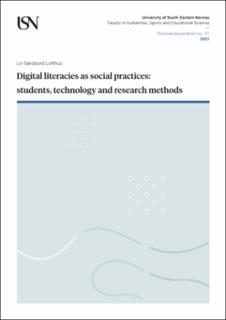Digital literacies as social practices: students, technology and research methods
Doctoral thesis
Published version
Permanent lenke
https://hdl.handle.net/11250/2832052Utgivelsesdato
2021Metadata
Vis full innførselSamlinger
Sammendrag
This article-based thesis explores students’ digital literacies both in and outside of the classroom. Digital literacies are more than digital skills, and here understood as social practices that consists of students, technology and research methods. The study seeks to illuminate digital literacies as social practices that vary in different contexts. The research that has been carried out was done in two separate field studies, one at an outdoor museum and one in the classroom to investigate students’ digital literacies in social studies. The students in focus all owned mobile digital devices that they used for schoolwork. To illuminate different aspects of the main investigation theme, four empirical studies are used, resulting in four articles. Article #1 focuses on the researcher’s role in data generation, and how this affects the social practices in focus, and the empirical data-material. Article #2 investigates students’ digital literacies when doing groupwork in the classroom with tablets. Article #3 seeks to illuminate how the usage of action cameras to get insight into the students’ digital literacies might affect the social practices in different ways. The study looks at how research cameras are both a part of the technology and the research methods that make out the social practices. Finally, article #4 examines how, when and for what the students use the different digital tools available to them, and when they seek information elsewhere. The findings from this thesis show how the students’ digital literacies are highly context reliant. Understanding digital literacies as social practices consisting of actions, interactions, affordances, agencies, humans and technologies, is a way of recognizing that human- technology interaction is much more than digital skills.

